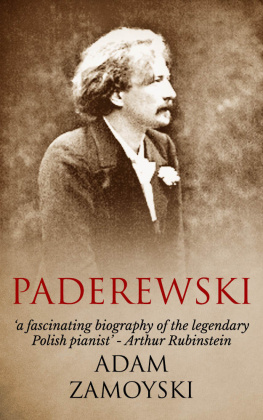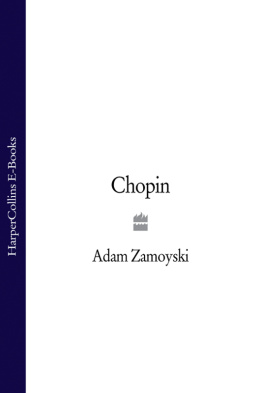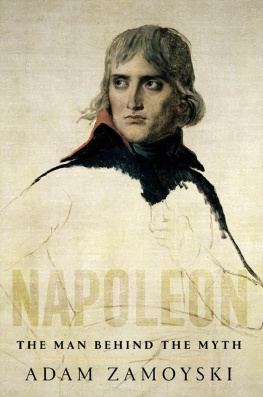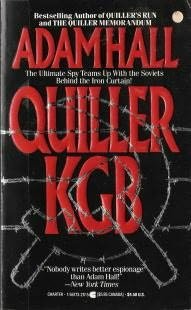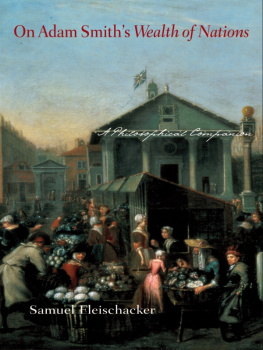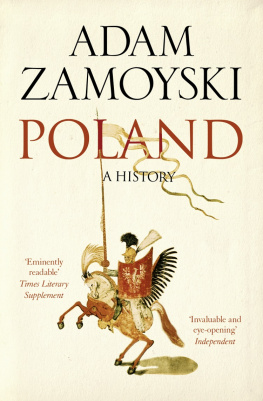Adam Zamoyski - Paderewski
Here you can read online Adam Zamoyski - Paderewski full text of the book (entire story) in english for free. Download pdf and epub, get meaning, cover and reviews about this ebook. year: 2015, publisher: Endeavour Press, genre: Non-fiction. Description of the work, (preface) as well as reviews are available. Best literature library LitArk.com created for fans of good reading and offers a wide selection of genres:
Romance novel
Science fiction
Adventure
Detective
Science
History
Home and family
Prose
Art
Politics
Computer
Non-fiction
Religion
Business
Children
Humor
Choose a favorite category and find really read worthwhile books. Enjoy immersion in the world of imagination, feel the emotions of the characters or learn something new for yourself, make an fascinating discovery.
- Book:Paderewski
- Author:
- Publisher:Endeavour Press
- Genre:
- Year:2015
- Rating:3 / 5
- Favourites:Add to favourites
- Your mark:
- 60
- 1
- 2
- 3
- 4
- 5
Paderewski: summary, description and annotation
We offer to read an annotation, description, summary or preface (depends on what the author of the book "Paderewski" wrote himself). If you haven't found the necessary information about the book — write in the comments, we will try to find it.
Paderewski — read online for free the complete book (whole text) full work
Below is the text of the book, divided by pages. System saving the place of the last page read, allows you to conveniently read the book "Paderewski" online for free, without having to search again every time where you left off. Put a bookmark, and you can go to the page where you finished reading at any time.
Font size:
Interval:
Bookmark:
Paderewski
Adam Zamoyski
Copyright Adam Zamoyski 1982
The right of Adam Zamoyski to be identified as the author of this work has been asserted by him in accordance with the Copyright, Designs and Patents Act, 1988.
First published in the United Kingdom in 1982 by William Collins Sons & Co.
This edition published in 2014 by Endeavour Press Ltd.
Table of Contents
Introduction
Paderewskis name was a household word to several generations. To people who knew nothing about music he was the archetype of the pianist; to those who knew nothing of Poland, he was the epitome of the flamboyant Pole; to those who had no clear idea of his political career he was a Mosaic leader of his people. He was the celebrity par excellence: the public could see and hear him in the concert hall and in the cinema, and they could read about him endlessly in the press, but in fact they knew nothing, or very little, about him. He sprang from a past of which little could be gleaned and lived in a closely knit world of his own creation. The press pried and invented, painting a fabulous image. Paderewski and his entourage countered with another, which they threw up like a smoke-screen to hide him from public scrutiny.
To find the real Paderewski has been no easy task, and the search has held something of the detective story. He was secretive and confided in very few people; they have confided in nobody. He hated writing letters, and many of those he did write have not survived two world wars. Of those that have, the most personal are guarded by people to whom he was a sort of god. His own memoirs and the two biographies published, with his blessing, during his lifetime provide an official version, which tells us very little about the man himself and invites a degree of scepticism. The figure which emerges is dull, conventional and lifeless and Paderewski was certainly none of these.
Since this could not possibly be the whole story, I found myself wondering what was being held back, and why. His own version of his political career is both ill-informed and distorted by subjectivity, but this is not unusual in such cases, nor is it particularly difficult to rectify. It became obvious that his role had been less important than he liked to think in some respects, more so in others. The accepted assessment of Paderewski the musician was vague, almost played down. He himself repeatedly insisted that his success was the product of hard work, not of any inspiration or particular approach to music. He gave no inkling of what he was trying to achieve in his compositions and how far he felt he had achieved it, except in very specific terms. It was as though he wished to avoid wider discussion of the subject.
It was, not surprisingly, in the area of his private life that I felt things were being concealed. A typical example is the bland way in which his marriage is represented as suddenly taking place, without much warning, to a recently divorced woman he had known for years. The discovery of a correspondence in Warsaw supplied me with both the truth and the reason for its suppression: Paderewski had in fact been the womans lover for at least ten years before her divorce. Similarly, I was puzzled by the fact that there was hardly a mention in his memoirs of the Princess de Brancovan, to whom he had dedicated some of his best compositions. Again, archives in Poland yielded the key to this reticence.
But prurience has not been a primary motive in writing this book. What intrigued me above all was to find out whether the polite conventions of contemporary biography were in fact helping to keep up the faade of a nonentity or obscuring a character of real interest. Was the great Paderewski, hailed far and wide as a genius, just a rather dull man whose feet of clay were being kept out of sight, or was he a fascinating man with a crop of emotions and problems too intimate to reveal?
Difficult as it was, my quest has been rewarding, and I should like to take this opportunity to thank those who helped me on my way. I owe a debt of gratitude to those who opened their libraries and archives to me, including: Professor Bohdan Kroll of the Archiwum Akt Nowych, Professor Witold Stankiewicz of the Biblioteka Narodowa and Dr. E. Paderewska-Chroscicka in Warsaw; Dr. Zdzislaw Jagodzinski of the Polish Library and Captain Waclaw Milewski of the Polish Institute and Sikorski Museum in London; Professor Richard Staar of the Hoover Institution at Stanford University; Helena Liibke in Los Angeles; the staff of the Pilsudski Institute of New York; Richard Belanger of the Conservatory Library at the University of Missouri; Sir Robin Mackworth-Young of the Royal Library, Windsor Castle; Jean Pierre Filipinetti, Edouard Weygand and John H. Steinway.
I have received gracious assistance on matters of detail from: Elizabeth Cuthbert, Malgorzata Perkowska, Elizabeth Wansbrough, Charles Cox, Richard Dorment, Marian Drozdowski, Heinrich Fraenkel, Werner Fuchss, Ignace La Grange, Gerrold Northrop-Moore, Andrzej Piber and Andrzej Rottermund, to all of whom I am deeply grateful. Finally, I extend my warmest thanks to those who knew Paderewski and helped me to know him better, particularly Mrs. Louis Appleton, Mme. Jan Ciechanowski, Halina Zelenska, Dr. Roman Jasinski, Count Zygmunt Mycielski and Count Raczynski.
*
Abbreviations
AAN Archiwum Glowne Akt Nowych, Warsaw: Paderewski Archive. See Archival Sources
APP Archiwum Polityczne Ignacego Paderewskiego. See Published Sources, under Paderewski, Ignacy Jan.
PM The Paderewski Memoirs. See Published Sources, under Paderewski, Ignacy Jan. Unpublished fragments in AAN.
PRO Public Record Office, London. See Archival Sources
Chapter One A Poor Start
At nine oclock in the evening of Saturday, 3 March 1888, an unknown Polish pianist ascended the stage of the Salle Erard. He was nervous frightened, in fact; it was his first recital in Paris, and his performances in Warsaw and Vienna had met with little more than mitigated indifference. He was so shy of his audience that he had begged the manager to turn the gas lights down as low as possible, but even in the murky gloom they thrilled at the sight of him. He wore a modest black frock-coat and a white shirt whose soft collar was folded down over a loosely tied white bow. From this collar emerged a long neck supporting a head immediately and intensely striking by its broad forehead, high cheekbones, strong nose and narrow eyes, but most of all by the red-gold hair which seemed to glow all around it like a halo. He was not, strictly speaking, beautiful, but the composition of the features emitted a harmony which those gathered there drank in as if they had unexpectedly come upon a long-sought perfection.
The young man walked on softly, bowed gracefully and sat down at the keyboard. Suddenly he struck several chords very hard, almost viciously, as though to dispel the tension. That he was nervous could be sensed from the halting yet aggressive way in which he played the first number on the programme, Beethovens C minor Variations. As he played, however, his fear evaporated and his touch grew more delicate; with one of Schuberts Moments Musicaux he beguiled his listeners; with Chopin he subjugated them; with four short pieces written by himself he titillated them; and with a galloping Liszt Rhapsody he swept them on to their feet in frenzied applause.
I felt that I should like to kiss the hands that had awakened a new world of music for me, was one ladys reaction, and it was not an isolated one.
The pianist felt that he had played rather acceptably, but he was utterly unprepared for the delirious enthusiasm he had provoked. As he was forced to play encore after encore, his bewilderment turned to alarm. When he tried to leave the stage, there was a rush to the platfrom and he was dragged back to the piano, in the words of an English lady. The public refused to leave the hall that night.
Next pageFont size:
Interval:
Bookmark:
Similar books «Paderewski»
Look at similar books to Paderewski. We have selected literature similar in name and meaning in the hope of providing readers with more options to find new, interesting, not yet read works.
Discussion, reviews of the book Paderewski and just readers' own opinions. Leave your comments, write what you think about the work, its meaning or the main characters. Specify what exactly you liked and what you didn't like, and why you think so.

